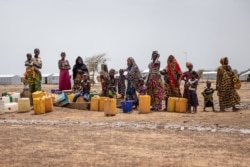Deep in Burkina Faso’s war-torn Sahel province lies the Goudoubo refugee camp. It was rebuilt after Islamist militants burned much of it to the ground last year.
Around 11,000 refugees live here in makeshift tents or plastic flat-pack shelters provided by the United Nations. They fled Mali, a country plagued by armed groups linked to the Islamic State and al-Qaida terror groups, to another country beset by the same problem.
Actor Angelina Jolie, who is special envoy for the U.N.’s refugee agency (UNHCR), recently visited Goudoubo to mark World Refugee Day and praised Burkina Faso for its treatment of the displaced.
“The truth is we are not doing half of what we could and should to find solutions to enable refugees to return home — or to support host countries, like Burkina Faso, coping for years with a fraction of the humanitarian aid needed to provide basic support and protection,” she said.
Other sites off-limits
Her visit took place in the country’s only major refugee camp. Official sites for the country’s 1.2 million internally displaced people (IDPs) are off limits to the media because of a government ban.
Burkina Faso is one of the world’s most neglected humanitarian crises, according to the Norwegian Refugee Council, and the West African country is struggling both to prevent terrorist attacks and to protect IDP rights.
But its security forces have been accused by a local human rights group, the Collective Against Impunity and Stigmatization of Communities, of atrocities against IDPs.
A victim of one attack, whose name is being withheld for his safety, described watching his friends being killed in front of him by security forces.
He said the security forces gathered up all the young people in the community, then burned everything — houses as well as crops. Then they took two people away and shot them dead. Another person was beaten to death right next to him, just a few feet away.
'Worrying trend'
Human Rights Watch said abductions and extrajudicial killings of civilians are common in Burkina Faso.
Jonathan Pedneault, an HRW researcher, said that "since 2019, Human Rights Watch has documented over 200 cases of extrajudicial killings by Burkinabe armed forces in the context of counterterrorism operations. This is an extremely worrying trend, which feeds, of course, in recruitment efforts by armed Islamist groups.”
IDPs live in constant fear, UNHCR said.
Fatoumata Sinkoun Kaba, a UNHCR spokesperson, said, "In conflict-affected areas of the Sahel, IDPs literally live with the fear of the next attack, and that’s what’s driving up the number of people forcibly displaced. And with that, of course, comes higher needs for basic humanitarian services.”
Burkina Faso’s Defense Ministry did not respond to requests for comment on the accusation of extrajudicial killings and abductions.






